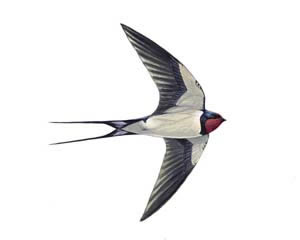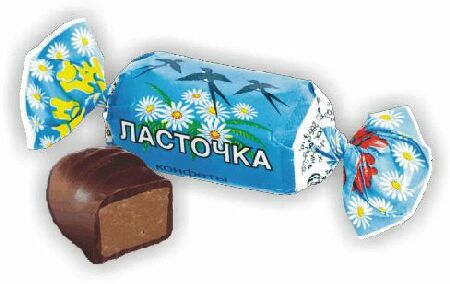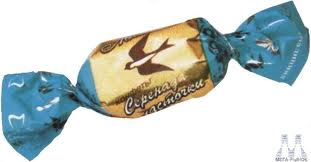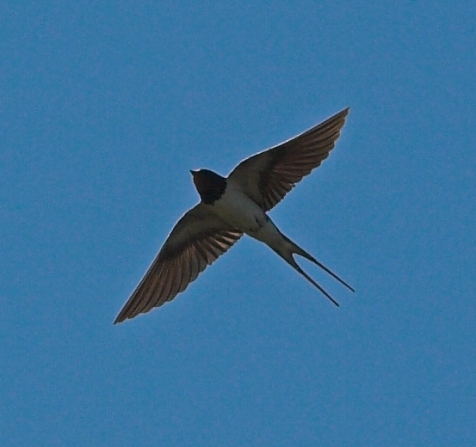Ласточка
Outside my apartment here in Kazan every morning and evening a flock of swallows flies around catching the twilight bugs. They are swift flying, split-tailed avians. Every once in a while one flies into my balcony through an open window and, confused by all the glass, can't figure how to get back out. I walk up from behind, gently wrap it in my hands and release it through the one open window. The Russian word for swallow is ласточка.
| Sg | Pl | |
| Nom | ласточка | ласточки |
| Acc | ласточку | ласточек |
| Gen | ласточки | |
| Pre | ласточке | ласточках |
| Dat | ласточкам | |
| Ins | ласточкой | ласточками |
A swallow looks like this.

| Вот летит ласточка! | There goes a swallow! |
| — В чём живут ласточки? — В гнёздах, сделанных из грязи. |
“What do swallows live in?” “In nests made of mud.” |
| Питаются деревенские ласточки насекомыми: мухи, кузнечики, сверчки, стрекозы, жуки и другие летающие насекомые составляют 99 % их рациона. (source) | Barn swallows feed on insects: flies, grasshoppers, crickets, dragonflies, beetles and other flying insects make up 99% of their diet. |
| — Ты любишь ласточек? — Люблю смотреть, как они летают по двору, но их чириканье напоминает звук плотоядных птиц из фильма «Чёрная дыра». |
“Do you like swallows?” “I like to watch them fly around the courtyard, but their chirping reminds me of the sound of the carnivorous birds from the movie ‘Pitch Black’.” |
Just as important as the birds themselves in Russia is the chocolate candy named after them, which looks like this.

So what is a ласточка?
| Ласточка - это конфета с помадным корпусом, глазированная шоколадной глазурью. | A ‘Lastochka’ is a fondant candy with a chocolate glaze. |
| В «Ласточке» — помада «Крем-брюле» с добавлением какао-порошка, цитрусовой подварки и сливочного масла. | A ‘Lastochka’ has a crème brûlée fondant with cocoa powder, citrus extract and butter added. |
This is a wonderful candy. There is another one on the market called серенада ласточки “serenade of the swallow” that looks like this.

This is almost the same in flavor to the ordinary ласточка, although the label specifies orange extract instead of citrus extract.
The Russians make wonderful candy. The only thing about Russian sweets that makes me scratch my head is their affection for meringue cookies. And those nasty waffle cookies. Hate them.

3 comments
Richard
“Кажется, что ласточки вкусно! Конфеты, не птицы!!! :))”
You can’t say such phrase. Maybe “Оказывается, ласточки вкусные!".
Don,
Thanks for the explanation. I was aware that Russian orthography had changed in 1918, but I guess I still have a lot to learn about the evolution of the language. The evolution of any language is fascinating and I’ll definitely look into this aspect of the Slavic languages.
Thanks for the post, Don. It’s great to learn not just Russian grammar and vocabulary but also about the little cultural things that make up everyday life for the Russians.
Кажется, что ласточки вкусно! Конфеты, не птицы!!! :))
I have two questions:
1.) In the chart above showing the Acc/Gen plural, is the “e” inserted simply to make pronunciation easier? (i.e., drop the “a” from the nominative singular and insert an “e"?)
2.) Are all plural accusative nouns governed by the “animate accusative” rule regardless of gender?
One typo: “Ты любишль ласточек?” I don’t think you need the “л” in “любишль".
Don responds: Richard, thanks for your comment. Regarding them…
1. You asked whether the insert vowel was to make pronunciation easier. It’s a bit more complex than that. For the most part those insert vowels appear in places where historically there used to be ‘reduced vowels’ that in certain contexts vanished and in others did not. The general concept is described as “the fall of the yers” in Slavic languages, where the yers were vowels that might have been short or relaxed. While sometimes some people say those vowels are “to make pronunciation easier,” it’s really part of a much more complex historical process.
2. Yes, all plural accusative nouns are governed by the ‘animate accusative’ rule.
3. Thanks! Typo corrected.
Form is loading...